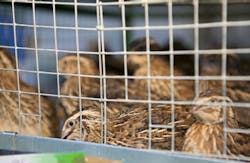A quail farm in California has raised concerns of a new outbreak of avian-borne virus, commonly known as bird flu, and prompted several countries to take restrictive measures regarding imports of poultry from the state, media reports revealed last week.
The state's Department of Food & Agriculture announced that the farm where low-pathogenic avian influenza was found on April 18 was located in Stanislaus County. Steve Lyle, spokesman for the department, explained that the farm had been quarantined and birds were being euthanized to restrict the outbreak. The established protocol for keeping the disease under control is being implemented, including carrying out epidemiological investigations and tests on other flocks. Other poultry farms in the area have been informed, so that they are prepared to act should the need arise, Lyle added.
Imports of poultry from California were banned by Taiwan and Russia, while Cuba imposed a ban on fresh or frozen poultry from birds raised or processed in Stanislaus County. Meanwhile, Japan banned imports of eggs laid after March 24 and of poultry slaughtered after that date, according to information from the U.S. Department of Agriculture (USDA).
These restrictions are unlikely to have a significant effect on U.S. poultry exports, since the state is not a major exporter, industry experts told Bloomberg. In 2012 California exported chicken worth $13 million, USDA data showed.
